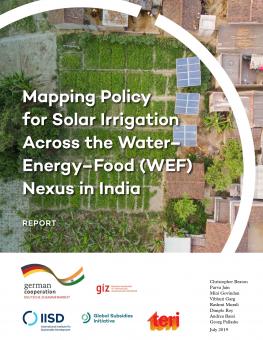
Mapping Policy for Solar Irrigation Across the Water-Energy-Food (WEF) Nexus in India
How are India's off-grid solar pump policies affecting the water–energy–food nexus? This paper maps out impacts and the key policies that are driving them.
Key Messages
- To effectively promote off-grid solar pumps in India, it is important to understand the full landscape of central and state policies across water, energy and food (WEF) systems.
- This paper maps such policies and finds that many, including policies to promote off-grid solar pumps, do not explicitly acknowledge or account for complex WEF interactions, limiting their effectiveness and in some cases undermining objectives other areas.
- It recommends for off-grid pump policies to be coordinated with an upscaled set of efforts on addressing the sustainable use of groundwater in India. It also advises careful monitoring and evaluation of KUSUM, the government's new solar pumps scheme.
Globally, many people do not have adequate access to water, energy and food: 2.1 billion people lack access to safely managed drinking water; almost 1 billion lack access to electricity and 2.7 billion lack access to clean cooking; and 821 million face chronic food deprivation. Yet water, energy and food systems are all under increasing pressure from rapid growth in economies, consumption patterns and population.
The Sustainable Development Goals (SDGs) recognize the need to deliver access sustainably through dedicated goals on each theme: SDG 2 (zero hunger), SDG 6 (clean water and sanitation) and SDG 7 (affordable and clean energy). As targets, the SDGs cannot themselves recognize or address linkages—but if all three targets are to be met by 2030, then it is important to weigh up potential trade-offs. The “water–energy–food (WEF) nexus” means that there are interconnections in all three areas. Implementing a policy to address one objective can have detrimental impacts on another.
This paper seeks to assist policy-makers and researchers in India who are working to promote the uptake of off-grid, solar-powered pumps for groundwater irrigation. It begins by setting out key WEF linkages of importance for off-grid solar pumps. It then establishes an approach for identifying policies across the WEF nexus that are key for off-grid solar pumps and maps these policies at the Central Government level and in two states: Bihar and Rajasthan.
It recommends for off-grid pump policies to be coordinated with an upscaled set of efforts on addressing the sustainable use of groundwater in India. It also advises careful monitoring and evaluation of KUSUM, the government's new off-grid solar pumps scheme.
You might also be interested in
Implementing Solar Irrigation Sustainably
This guidebook provides recommendations to state policy-makers on how they can implement solar irrigation models, particularly decentralized solar plants for irrigation under the PM-KUSUM scheme, effectively and sustainably.
Increased Support Needed to Achieve India's Clean Energy Goals
India is on track to achieve many of its 2030 clean energy goals but needs to step up government support measures to accelerate the deployment of offshore wind, electric vehicles, and green hydrogen, according to a new report.
Budgeting for Net Zero
This study estimates the cost gap for battery energy storage systems (BESSs), offshore wind, solar photovoltaic (PV), electric vehicles (EVs), and green hydrogen (GH2) to inform government support.
India Faces Clean Energy Challenges as Energy Demand Soars and Global Fossil Fuel Subsidies Rise
New research finds the global energy crisis and increasing energy demand have pushed India's energy subsidies to a 9-year high.